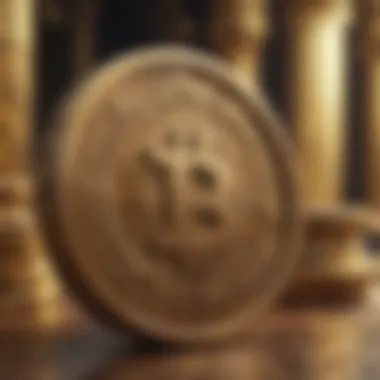Exploring the Intriguing Convergence of Islamic Coinage and Cryptocurrency


What is Islamic Coin Crypto:
Islamic Coin Crypto is a groundbreaking digital asset that uniquely combines Islamic principles with modern technology. It was innovatively created by a team of scholars well-versed in Islamic finance and cryptocurrency experts. The development of Islamic Coin Crypto focuses on aligning with Sharia compliant practices while embracing the efficiency and security of blockchain technology.
There are currently three main types of Islamic Coin Crypto, each holding its specific purpose within the ecosystem. These include ZakatCoin, HalalChain, and TaqwaCash. Each type is tailored to cater to different aspects of Islamic finance, enabling users to engage in transactions adhering to Islamic laws.
The primary purpose of Islamic Coin Crypto is to provide a digital alternative for conducting financial transactions following Islamic principles. It seeks to offer a secure, transparent, and compliant medium for individuals and businesses within the Islamic finance sector. By leveraging blockchain technology, Islamic Coin Crypto ensures decentralization and trustless transactions.
Islamic Coin Crypto is extensively used for various purposes within the Muslim community, including Zakat payments, Halal investment opportunities, charitable donations, and secure remittances. Its versatility allows users to engage in diverse financial activities while upholding Islamic values and ethics.
The tokenomics of Islamic Coin Crypto revolves around different tokens that serve distinct functions within the ecosystem. These include utility tokens for transaction fees, governance tokens for voting rights, and staking tokens for earning rewards through participation in network activities.
Furthermore, the Islamic Coin Crypto ecosystem provides an array of tools and platforms to facilitate seamless user interaction. These include decentralized exchanges (DEXs) for trading, digital wallets for secure storage, and smart contracts for executing automated agreements.
When it comes to engaging with Islamic Coin Crypto, users have the option to participate in swaps rather than traditional trading. The primary difference lies in the mechanism of exchanging tokens directly from one cryptocurrency to another, offering a more efficient and cost-effective method for users to access different assets.
To buy Islamic Coin Crypto, individuals can utilize various cryptocurrency exchanges that list the specific tokens. They need to create an account, deposit funds, and navigate to the trading pair of choice to purchase Islamic Coin Crypto tokens securely.
Introduction
Diving into the realm where Islamic coinage intersects with the innovative world of cryptocurrency unveils a fascinating journey merging tradition with modernity. This exploration sheds light on the historical significance of Islamic coins and the disruptive influence of digital currencies on Islamic finance, offering a fresh narrative that resonates with the blend of heritage and technological advancement in the financial landscape.
Overview of Islamic Coinage
Historical Evolution
Delving into historical evolution reveals the pivotal role of Islamic coins in facilitating trade, spreading cultural motifs, and serving as markers of authority. The evolution showcases the adaptability of Islamic coins to changing economic landscapes and the enduring legacy they carved in the numismatic world. This historical context is crucial in comprehending the impact of Islamic coinage on contemporary financial practices, making it a cornerstone in deciphering the nuances of traditional monetary systems.
Design Characteristics
The intricate design characteristics of Islamic coins reflect a mastery of artistry, symbolism, and cultural identity. Each coin's design symbolizes the era, region, and beliefs of the issuing authority, encapsulating a visual narrative that transcends time. The impeccable craftsmanship exhibited in calligraphy, geometric patterns, and metalwork techniques elevates Islamic coins to not just mediums of exchange but also artistic expressions of a vibrant civilization.
Exploring design characteristics unveils the detailed craftsmanship and attention to detail embedded in Islamic coins, distinguishing them from other numismatic forms. The significance of design lies not just in aesthetic appeal but also in conveying historical, religious, and cultural messages that enrich our understanding of the past. Analyzing design characteristics provides a deeper appreciation for the artistic heritage preserved in Islamic coinage and its relevance in contemporary contexts, making it a compelling subject for examination in the narrative of Islamic coin and crypto.
Rise of Cryptocurrency
Concept and Technology
The rise of cryptocurrency marks a paradigm shift in financial transactions, introducing decentralized digital currencies powered by blockchain technology. Understanding the concept and technology behind cryptocurrency is paramount in grasping its disruptive potential in reshaping traditional financial systems. Cryptocurrency eliminates intermediaries, enhances security, and offers transparency in transactions, revolutionizing the way we perceive and engage with money.
Exploring the concept and technology behind cryptocurrency reveals a revolutionary approach to finance, where peer-to-peer transactions redefine the decentralized nature of fund transfers. The blockchain technology underpinning cryptocurrencies ensures immutability, traceability, and authenticity of transactions, fostering trust in a distributed network of users. The innovative features embedded in cryptocurrency pave the way for faster, cheaper, and more inclusive financial transactions, heralding a new era in monetary exchange.
Implications in Finance


The implications of cryptocurrency in finance extend beyond technology to impact regulatory frameworks, financial inclusion, and global economic dynamics. Cryptocurrency challenges traditional banking systems, offering a borderless, accessible alternative for individuals excluded from formal banking channels. Its disruptive potential in fintech innovations, smart contracts, and tokenization of assets opens new avenues for investment, savings, and financial empowerment.
Examining the implications of cryptocurrency in finance uncovers a transformative landscape where digital currencies democratize financial access, streamline cross-border transactions, and introduce innovative solutions to age-old challenges. The disruptive nature of cryptocurrency in reshaping financial paradigms underscores its significance in fostering financial inclusion, enhancing transactional efficiency, and paving the way for a more interconnected global economy.
This meticulous exploration of Islamic coinage and cryptocurrency sets the stage for deeper insights into their convergence, offering a nuanced perspective on the evolution of monetary systems and the interplay between tradition and innovation in the financial world.
Historical Significance
In this section of the article, we delve into the immense historical significance of the intersection between Islamic coinage and cryptocurrency. The historical context provides a foundational understanding of how these two disparate yet interconnected worlds have evolved over time. By examining the roots of Islamic coinage alongside the modern emergence of cryptocurrencies, we gain a deeper appreciation for the rich tapestry of financial systems that have shaped our world.
Islamic Numismatics
Role of Coins in Islamic Civilization
The role of coins in Islamic civilization represents a pivotal aspect of financial history. Coins served not only as a medium of exchange but also as symbols of authority, power, and cultural identity. The standardized nature of Islamic coins facilitated trade across vast territories, promoting economic stability and connectivity within the Islamic world. This section highlights how coins were not merely instruments of commerce but reflections of the broader socio-political landscape of the era.
Symbolism and Inscriptions
Symbolism and inscriptions on Islamic coins offer valuable insights into the beliefs, values, and aspirations of societies minting these coins. From intricate calligraphy to symbolic representations of faith, each coin carries a story within its design. The use of inscriptions often conveyed religious messages or honored rulers, emphasizing the intersection of art, faith, and governance. Understanding the symbolism and inscriptions on Islamic coins provides a window into the minds of the people who minted and used them, adding layers of meaning to these numismatic artifacts.
Influence on Trade and Economy
Barter System to Coinage
The transition from a barter system to coinage marked a significant paradigm shift in economic history. The introduction of standardized coins in Islamic civilization streamlined commercial transactions, enhanced market efficiency, and fostered greater economic growth. By replacing cumbersome barter exchange with a portable and universally accepted medium of exchange, coins revolutionized the way goods and services were exchanged. This evolution in trade practices laid the foundation for sophisticated financial systems that continue to impact global economies.
Trade Routes
Trade routes played a crucial role in the dissemination of Islamic coins throughout the known world. These routes not only facilitated the physical exchange of goods but also served as conduits for cultural exchange and diplomatic interaction. The interconnected web of trade routes crisscrossing regions allowed Islamic coins to transcend geographical boundaries, shaping economic relationships and cultural interactions on a grand scale. The discussion of trade routes illuminates the interconnectedness of disparate civilizations and the pivotal role of Islamic coins in facilitating global trade.
Artistic Expression
Calligraphy and Geometry
Islamic coins are renowned for their exquisite calligraphy and geometric patterns, showcasing a harmonious blend of artistry and mathematical precision. Calligraphy, with its fluid lines and intricate scripts, conveyed profound meanings rooted in religious texts and cultural symbolism. The incorporation of geometric motifs reflected a sophisticated understanding of symmetry and proportion, infusing each coin with aesthetic allure and intellectual depth. Exploring the artistic elements of Islamic coins provides a gateway to appreciating the fusion of creativity and precision in numismatic design.
Metalwork Techniques
Metalwork techniques employed in minting Islamic coins exemplify the craftsmanship and technological advancements of their time. Innovations in metallurgy allowed for the production of durable and aesthetically pleasing coins that stood the test of time. From casting to engraving, each step in the minting process required skill and precision to create coins that were not only practical for daily transactions but also objects of beauty. Examining the intricate metalwork techniques offers a glimpse into the ingenuity and artistry of ancient craftsmen who elevated coinage to an art form.
Islamic Finance and Cryptocurrency
Islamic Finance and Cryptocurrency play a pivotal role in the convergence of traditional Islamic financial principles and the innovative realm of digital currencies. This section explores the significance of incorporating Sharia-compliant practices in the cryptocurrency ecosystem. By aligning with Islamic finance principles, cryptocurrencies can capitalize on a vast market that values ethical and transparent financial transactions. The fusion of these two worlds opens up opportunities for Muslims and non-Muslims alike to engage in financial transactions that adhere to Islamic tenets.
Sharia Compliance


Principles of Islamic Finance
Principles of Islamic Finance form the foundation for Sharia-compliant financial transactions. These principles, such as prohibition of riba (usury) and adherence to risk-sharing partnerships, ensure fairness and ethical conduct in financial dealings. By integrating these principles into cryptocurrency practices, the industry not only caters to the Islamic finance market but also promotes a more inclusive and ethical financial ecosystem. The inherent risk-sharing nature of Islamic finance principles fosters stronger trust among users and enhances the credibility of cryptocurrency platforms that adhere to these guidelines.
Evaluation of Cryptocurrency
Evaluating cryptocurrencies from a Sharia-compliant perspective involves scrutinizing their underlying technology, governance structure, and financial mechanisms to ensure compliance with Islamic financial principles. The assessment considers factors such as transparency, risk-sharing, and avoiding prohibited activities like gambling and speculation. Cryptocurrencies that meet these criteria can appeal to a broader audience seeking ethical investment opportunities while adhering to Islamic values. However, the evaluation process also highlights the challenges in adapting cryptocurrencies to comply with intricate Sharia laws and may require ongoing oversight to maintain compliance.
Challenges and Opportunities
Regulatory Hurdles
Regulatory hurdles present a significant challenge to the integration of Islamic finance and cryptocurrency. The complex regulatory landscape globally, coupled with varying interpretations of Sharia principles, creates obstacles for fintech companies and cryptocurrency projects aiming to cater to the Islamic finance market. Navigating these regulatory hurdles requires collaboration between policymakers, financial institutions, and Sharia scholars to develop frameworks that reconcile traditional Islamic finance principles with digital financial innovations, ensuring legal compliance and consumer protection.
Financial Inclusion
Financial inclusion emerges as a key opportunity in merging Islamic finance with cryptocurrency. By providing access to financial services that are compliant with Islamic laws, digital currencies can empower underserved populations, including unbanked Muslim communities. Promoting financial inclusion through Sharia-compliant cryptocurrency initiatives not only expands economic participation but also fosters social equity and poverty alleviation in regions where traditional banking services are scarce. Embracing financial inclusion as a core principle can drive the growth and acceptance of Islamic finance within the crypto ecosystem.
Digital Islamic Banking
Emergence of Fintech Solutions
The emergence of fintech solutions in the field of Islamic banking signifies a progressive integration of technology with traditional financial practices. Fintech innovations such as blockchain, smart contracts, and digital payment systems offer efficient and secure avenues for conducting Islamic financial transactions. These solutions enhance transparency, automate processes, and mitigate risks associated with conventional banking methods, paving the way for a more accessible and streamlined Islamic banking experience. Leveraging fintech solutions improves operational efficiency and customer satisfaction within Islamic financial institutions, promoting greater adoption of Sharia-compliant digital banking services.
Islamic Cryptocurrency Projects
Islamic cryptocurrency projects represent a promising avenue for combining the principles of Islamic finance with the disruptive potential of blockchain technology. These projects aim to develop digital currencies that align with Sharia principles, offering Muslim investors an ethical and compliant alternative to conventional cryptocurrencies. By incorporating features such as Zakat payments, transparent governance structures, and community-driven initiatives, Islamic cryptocurrency projects foster trust and credibility among users who prioritize Islamic financial compliance. However, ensuring the sustainability and scalability of these projects requires ongoing collaboration with Islamic scholars, regulatory bodies, and technology experts to address evolving market demands and regulatory challenges.
Contemporary Trends
Tokenization of Assets
Real Estate and Commodities
Discussing real estate and commodities within the tokenization of assets framework unveils a transformative shift in traditional investment avenues. Real estate and commodities, as integral components of this article, play a pivotal role in diversifying portfolios and increasing accessibility to previously exclusive markets. Their key characteristic lies in offering tangible assets that can be digitally represented, allowing for fractional ownership and increased liquidity. The unique feature of real estate and commodities tokenization lies in democratizing investment opportunities, expanding financial inclusion for a broader range of investors while potentially reducing barriers to entry typically associated with these asset classes.
Blockchain Applications
Exploring blockchain applications surrounding the tokenization of assets offers a glimpse into the decentralized infrastructure underpinning this transformative process. Blockchain applications, a cornerstone of modern financial innovation, provide transparency, security, and immutability to asset tokenization. Their key characteristic lies in establishing trustless ecosystems where transactions are securely recorded and verified. The unique feature of blockchain applications is their potential to revolutionize digital asset ownership, allowing for seamless peer-to-peer transactions, smart contracts, and fractional ownership. However, challenges such as scalability and regulatory compliance also accompany this technology, necessitating careful consideration within the context of Islamic coin and crypto convergence.
Cross-Cultural Exchange
Global Adoption


The concept of global adoption within the intersection of Islamic coin and crypto signifies a shift towards universal acceptance and integration of digital assets. Global adoption, as explored in this article, emphasizes the widespread recognition and utilization of cryptocurrency and tokenized assets across diverse cultural and geographical landscapes. Its key characteristic lies in fostering financial inclusivity and borderless transactions, transcending traditional banking constraints. The unique feature of global adoption is its potential to reshape cross-border transactions, trade agreements, and economic interactions, paving the way for a more interconnected global economy. However, challenges related to regulatory variations and technological infrastructures underscore the complex nature of achieving seamless global adoption within the realm of Islamic finance and cryptocurrency.
Cultural Preservation
Cultural preservation in the context of cross-cultural exchange highlights the importance of respecting and safeguarding diverse heritage values amidst financial innovation. It underscores the significance of maintaining cultural identities and historical narratives while navigating the digital transformation of financial systems. The key characteristic of cultural preservation is its role in fostering a harmonious coexistence between modern financial practices and traditional value systems, encouraging cultural enrichment rather than homogenization. The unique feature of cultural preservation lies in its potential to bridge cultural divides, preserve intangible heritage, and promote mutual understanding in global financial interactions. However, balancing innovation with heritage conservation poses challenges, requiring a delicate equilibrium to uphold the integrity of cultural practices within the evolving landscape of Islamic coin and cryptocurrency convergence.
Educational Initiatives
Digital Learning Platforms
The emergence of digital learning platforms within the realm of educational initiatives signifies a paradigm shift in disseminating knowledge and fostering financial literacy. Digital learning platforms, a fundamental component of this article, offer accessible and interactive avenues for individuals to explore the intricacies of Islamic finance and cryptocurrency dynamics. Their key characteristic lies in providing personalized learning experiences, self-paced modules, and real-time updates on market trends, catering to diverse learning styles and preferences. The unique feature of digital learning platforms is their ability to democratize financial education, empowering individuals to make informed decisions in the ever-evolving landscape of digital assets and traditional finance. However, ensuring quality content, reliable sources, and enriching learning experiences remain essential considerations in leveraging digital learning platforms effectively within the context of Islamic coin and crypto exploration.
Research Collaborations
Research collaborations in the educational initiatives section elucidate the collaborative efforts aimed at advancing knowledge, fostering innovation, and driving sustainable solutions within the intersection of Islamic coin and cryptocurrency realms. Research collaborations, a catalyst for interdisciplinary dialogue and academic rigor, facilitate in-depth analyses, empirical studies, and critical insights into the evolving financial paradigms. Their key characteristic lies in promoting synergies between academic institutions, industry experts, and policymakers to collectively address the complexities of Sharia compliance, technological disruptions, and regulatory frameworks. The unique feature of research collaborations lies in their potential to bridge theoretical knowledge with practical applications, guiding policy formulation, industry best practices, and continuous learning within the dynamic landscape of Islamic finance and cryptocurrency convergence. However, aligning diverse research agendas, securing sustainable funding, and fostering meaningful partnerships pose challenges, necessitating strategic alignment and shared vision to propel educational initiatives forward in the realm of Islamic coin and crypto exploration.
Future Prospects
In the realm of Islamic coinage merging with the innovative world of cryptocurrency, exploring future prospects is of paramount importance. Looking ahead, the integration of smart contracts stands out as a key area poised for substantial growth and transformation within Islamic finance. Smart contracts, known for their self-executing nature triggered by predefined conditions, offer transparency, security, and efficiency in financial transactions. This innovation holds the potential to revolutionize traditional contractual agreements by automating processes, reducing intermediaries, and enhancing trust among transacting parties.
Decentralized finance (DeFi) emerges as another pivotal element in shaping the future landscape of Islamic finance and digital currencies. DeFi, characterized by open access, interoperability, and democratized financial services, aligns closely with Islamic finance principles of fairness and transparency. Its decentralized nature eliminates the need for traditional financial institutions, facilitating greater financial inclusion and accessibility for underserved populations. However, challenges such as regulatory uncertainties and security concerns must be addressed to fully realize the benefits of DeFi in the Islamic finance realm.
Innovations in Islamic Finance
Smart Contracts
Smart contracts play a crucial role in reshaping the paradigm of Islamic finance by introducing automation, security, and decentralization. Their key characteristic lies in their self-executing nature, eliminating the need for intermediaries and ensuring trust through code-enforced agreements. The unique feature of smart contracts lies in their tamper-proof and immutable nature, reducing the risk of fraud and enhancing transactional efficiency within Islamic finance. Although hailed for their efficiency and transparency, smart contracts also pose challenges related to code vulnerabilities and legal enforceability, emphasizing the importance of continuous innovation and regulatory clarity.
Decentralized Finance
Decentralized finance (DeFi) stands as a disruptive force in Islamic finance, offering decentralized solutions for financial services traditionally monopolized by centralized institutions. The key characteristic of DeFi lies in its permissionless access and trustless interactions, enabling direct peer-to-peer transactions without the need for intermediaries. The unique feature of DeFi is its potential to foster financial inclusion and disintermediate financial services, aligning with Islamic finance principles of equitable wealth distribution. However, decentralized finance also faces challenges such as regulatory frameworks, security risks, and scalability issues that necessitate ongoing development and adaptation to ensure its successful integration within Islamic finance.
Technological Advancements
AI and Machine Learning
The integration of artificial intelligence (AI) and machine learning technologies holds profound implications for the evolution of Islamic finance and digital currencies. AI's key characteristic lies in its ability to analyze vast and complex data sets, enabling predictive analytics, risk assessment, and personalized financial solutions in Islamic finance. The unique feature of AI and machine learning is their capacity to enhance decision-making processes, optimize operational efficiencies, and drive innovation in financial services. Despite their advantages in automating tasks and detecting patterns, AI and machine learning also raise concerns related to data privacy, algorithm bias, and regulatory compliance, necessitating a balanced approach towards their implementation within Islamic finance.
Quantum Computing
Quantum computing represents a cutting-edge technology that has the potential to revolutionize the realm of Islamic finance and cryptocurrency. Its key characteristic lies in leveraging quantum phenomena to perform complex computations exponentially faster than classical computers, unlocking new possibilities for cryptography, data security, and financial modeling. The unique feature of quantum computing is its capacity to solve hitherto intractable problems in areas such as encryption and optimization, offering a paradigm shift in financial technology. Despite its transformative potential, quantum computing also presents challenges such as hardware complexity, error rates, and scalability issues that require ongoing research and development to harness its capabilities effectively in the Islamic finance domain.
Ethical Considerations
Sustainability Practices
Incorporating sustainability practices into Islamic finance and digital currencies is essential to promote ethical, environmental, and socially responsible financial practices. Sustainability practices emphasize responsible investing, resource conservation, and community development, aligning with Islamic finance principles of ethical finance and social welfare. The key characteristic of sustainability practices lies in their holistic approach towards balancing economic prosperity with environmental protection and social well-being. The unique feature of sustainability practices is their long-term impact on fostering sustainable development, mitigating climate change risks, and promoting equitable growth within the Islamic finance ecosystem. However, implementing sustainability practices also poses challenges such as measuring impact, ensuring transparency, and overcoming resistance to change, underscoring the importance of integrating sustainability into financial strategies and decision-making processes.
Social Impact
Considering the social impact of Islamic finance and digital currencies is crucial in driving positive change and fostering inclusive growth in diverse communities. Social impact initiatives aim to address social inequalities, empower marginalized groups, and promote financial well-being through inclusive financial services. The key characteristic of social impact lies in its focus on creating lasting benefits for society, fostering economic empowerment, and promoting social cohesion. The unique feature of social impact initiatives is their ability to catalyze transformative change by aligning financial incentives with social outcomes, driving meaningful progress towards sustainable and inclusive economic development within the Islamic finance landscape. Nevertheless, challenges such as scalability, measuring outcomes, and ensuring stakeholder engagement remain critical factors that necessitate collaborative efforts and innovative solutions to maximize social impact in Islamic finance and digital currencies.







